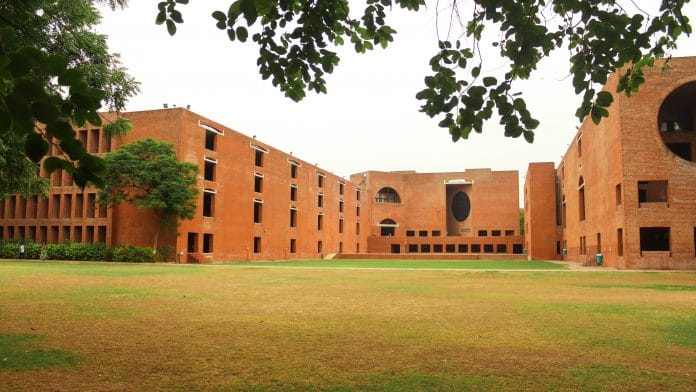Committee to frame the rules of the new IIM Act decides against granting the directors’ demand to give the govt a say in their removal.
New Delhi: Dissenting voices have been heard within the Indian Institute of Management (IIM) community over the increased control of the board of governors under the new IIM Act. And now, a special panel set up to frame the rules of the Act has decided that if an IIM director is to be removed, the board will need to approve it with two-thirds majority instead of a simple majority.
The rules committee, however, has decided against bringing in any governmental say in the removal of IIM directors, as was being demanded by many of the directors themselves, ThePrint has learnt.
The rules committee will make its final recommendations to the government, which will be circulated to all IIM directors and chairpersons and scrutinised by the Union Law Ministry before being notified.
Provisions of the Act
Some IIM directors have argued that while their office has been placed firmly under the control and scrutiny of a board that will appoint itself, little has been brought in to ensure greater accountability and transparency by the board.
There has been considerable disquiet over Section 16 and sub-sections 4 and 7 of the IIM Act, 2017, which allow an institute’s board to initiate the removal of the director on several counts.
These clauses say that the director “shall exercise the powers and perform the duties as may be assigned to him under this Act or the regulations or as may be delegated to him by the board”.
The board may lay down the criteria to be followed by the director while exercising powers and performing his duties, which shall be evaluated annually. However, “if the board is of the opinion that such criteria has not been followed, then, the board may, after giving an opportunity of being heard to the director, initiate action for removal of such director under sub-section 7”.
Sub-section 7 states that removal “can be initiated by the board of a director adjudged as an insolvent or convicted of an offence which, in the opinion of the board, involves moral turpitude”.
Removal can be initiated also if the director has become physicaIly or mentally incapable of acting as a director; or has acquired such financial or other interests as is “likely to affect prejudicially his functions as a director”; or has abused his position or conducted himself in a way that continuing this office would be “prejudicial to the public interest”.
What happened at the rules committee meeting
Many of the newer IIMs have expressed strong reservations on this issue pointing out that an all-powerful board may wield its influence to ease out a director in the absence of any other checks and balances, which were present earlier through governmental control. While the Act is silent on the procedure for removal of the director, the rules committee is to address this aspect.
At a committee meeting on 17 February, it was finally agreed that two-thirds majority would be required to remove a director. It is still under consideration whether two-thirds of the full IIM board strength of 15 members would need to weigh in to proceed with the removal, or two-thirds of those in attendance at the board meeting would suffice.
ThePrint has learnt that there was a view in the rules committee to ensure greater protection for the office of the IIM director through some form of governmental control, but it was finally decided that a two-thirds majority verdict would ensure a fair mechanism for removal procedures.
Bringing in governmental control, as some of the newer IIMs have been suggesting, would not be in keeping with the IIM Act as it exists now, sources said.
What was the procedure in the past?
Before the IIM Act came into effect, both the appointment as well as removal of an IIM director required the intervention of the Union Human Resource Development Ministry and the Appointments Committee of the Cabinet.
There has been considerable debate within the government on the degree of autonomy and governmental control over IIMs ahead of the drafting of the IIM Bill, with the Prime Minister’s Office weighing strongly in favour of near-complete autonomy to the institutes, even though the ministry preferred some form of governmental say.
As per the IIM Act, a new director would now be appointed out of the panel of names recommended by a search-cum-selection committee to be constituted by the board.






